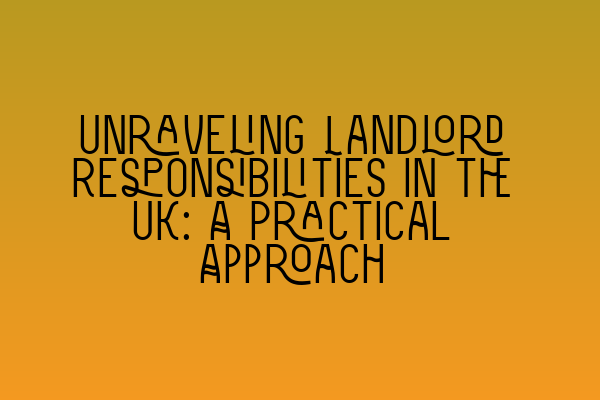Unraveling Landlord Responsibilities in the UK: A Practical Approach
In the ever-evolving world of property law, it is essential to have a clear understanding of the responsibilities and obligations that fall upon landlords in the UK. From ensuring the safety of their tenants to complying with legal requirements, landlords have a myriad of duties that must be diligently fulfilled. In this blog post, we will unravel these responsibilities in a practical and comprehensive manner.
1. Safety First: Gas and Electrical Safety Checks
Safety should always be the utmost concern for landlords, and this begins with conducting gas and electrical safety checks. These checks are essential to ensure that all gas appliances, fittings, and electrical installations are in safe working order. Additionally, landlords must provide tenants with a gas safety certificate and ensure that any necessary remedial work is carried out by a qualified professional. By adhering to these regulations, landlords can mitigate the risk of accidents or potential harm to their tenants.
2. Fire Safety: Smoke Alarms and Carbon Monoxide Detectors
Another crucial responsibility for landlords is to ensure fire safety within their properties. This includes the requirement of smoke alarms on each floor of the building and carbon monoxide detectors in rooms with solid fuel appliances. Regular testing and maintenance of these devices are necessary to ensure they are functioning properly, protecting tenants from fire-related hazards. Landlords must also provide guidance on fire safety measures, such as escape routes and the location of fire extinguishers.
3. Energy Efficiency: EPC Requirements
In recent years, there has been an increasing emphasis on reducing carbon emissions and promoting energy efficiency in the UK. Landlords must, therefore, obtain an Energy Performance Certificate (EPC) for their properties. This certificate rates the energy efficiency of the building and provides recommendations for improvements. It is mandatory for landlords to have a valid EPC when letting a property, and failure to comply may result in penalties. By promoting energy efficiency, landlords not only fulfill their legal obligations but also contribute to a greener future.
4. Property Maintenance: Repairing and Maintaining the Property
The responsibility of maintaining the property in a habitable condition lies firmly on the shoulders of landlords. This includes promptly addressing any repairs that arise during the tenancy period. Landlords should conduct regular inspections to identify any maintenance issues that require attention, ensuring that the property remains in a safe and comfortable condition. By fulfilling their duty to maintain the property, landlords create a positive living environment for their tenants, enhancing tenant satisfaction and minimizing potential disputes.
5. Tenancy Agreements: Creating Clear and Comprehensive Contracts
One of the key aspects of being a responsible landlord is the creation of clear and comprehensive tenancy agreements. These agreements outline the rights and responsibilities of both the landlord and the tenant, setting clear expectations from the beginning of the tenancy. It is crucial to include important terms such as rent payment details, maintenance responsibilities, and any additional clauses specific to the property. By having a well-drafted tenancy agreement, landlords can minimize potential misunderstandings and disputes.
6. Protection of Tenant Deposits
In the UK, landlords are legally required to protect their tenants’ deposits in a government-approved tenancy deposit scheme. This scheme ensures that the deposit is safeguarded and fairly returned at the end of the tenancy, provided the tenant has met their obligations. By complying with this requirement, landlords guarantee transparency and fairness in their dealings with tenants, fostering trust and positive landlord-tenant relationships.
7. Compliance with Letting Regulations: Right to Rent Checks and Licensing
Landlords must also be aware of and comply with various letting regulations in the UK. This includes conducting right to rent checks to ensure that tenants have the legal right to rent a property in the country. Additionally, some properties may require licensing under certain local authority schemes, such as Houses in Multiple Occupation (HMO) licensing. By staying informed and adhering to these regulations, landlords can avoid potential legal issues and penalties.
Conclusion
Being a landlord in the UK comes with a set of important responsibilities that must be understood and fulfilled. By prioritizing safety, maintaining the property, creating comprehensive tenancy agreements, protecting deposits, and complying with regulations, landlords can create a positive and compliant renting experience for their tenants. With a practical approach to these responsibilities, landlords can navigate the intricacies of property law and uphold their legal obligations.
Related Articles:
– SQE 1 Practice Exam Questions
– SQE 1 Practice Mocks FLK1 FLK2
– SQE 2 Preparation Courses
– SQE 1 Preparation Courses
– SRA SQE Exam Dates
